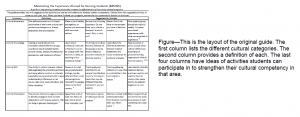Jordyn Whiting and Dr. Shelly Reed, College of Nursing
Study abroad programs are a great way to help students become more culturally educated, and the number of students choosing to participate in these programs has more than doubled in the last ten years. In a world of increasing globalization, nurses are more and more likely to care for patients of a cultural background different from their own. This increased diversity shows a need for greater cultural competence in order to provide the safest and highest quality of care possible. However, very little research is available on how to plan for a study abroad experience from a student perspective. As these experiences will benefit nursing students and those they care for in the future, it is important to understand what activities will maximize learning. A research-based guide, from a student perspective, will help students take better advantage of experiences abroad and increase their cultural competency.
A literature review using online databases in the BYU library (including CINAHL and MEDLINE) was conducted using search terms such as nursing student, student, cultural competency, cultural sensitivity, cultural awareness, study abroad, international experience, and exchange program. Articles pulled from the online search were used to gather what little information there is.
Competence-enhancing activities were formulated using brief anecdotal summaries and trending study abroad outcomes found in the articles. The guide’s framework came from Josepha Campinha-Bacote’s 2002 article, “The Process of Cultural Competence in the Delivery of Healthcare Services: A Model of Care,” and its subsequently updated versions (2007 and 2011). Originally, there were 16 activities in four categories: cultural awareness, cultural knowledge, cultural skill, and cultural desire. The guide also included 16 blank squares where students could create their own activities. The guide contains a reflective writing portion where students can think about their experiences as a whole and how they can implement what they learned into practice. The completed guide is called the MEANS (Maximizing the Experience Abroad for Nursing Students) Guide. Each student received a small prize for every set of eight activities he/she individually completed.
A total of 12 undergraduate students used the guide in two different study abroad programs. All 12 students used the guide while participating in a Global Health and Human Diversity program with the College of Nursing in Tonga; the guide was used a second time by the researcher, Jordyn Whiting, while participating in a mentored research study abroad program in Uganda.
All 12 students completed a minimum of eight activities, most completed a few extra, and three students completed all 16 suggested activities. Three students wrote their own activities while the rest used only suggested ones. All participants answered the reflective writing questions. This guide was helpful as it provided an overview of cultural concepts, much like section headings in a textbook provide an overview of the chapter content. Knowing about possible cultural differences before entering the field was useful for preparation for, participation in, and internalization of study abroad experiences.
After the implementation and upon review from three global health experts, revisions to the guide are in the process of being made, and additional activities and reflective writing questions, as well as an appendix (with additional resources), are being added.
Following the initial round of revisions suggested by the experts, the number of suggested activities nearly tripled. Because the guide is so much longer, it is less user-friendly and may be too overwhelming for students already busy with other assignments. Because it is meant to be a simple guide, further revisions to improve readability may be necessary before it is ready to be used on a large scale. This guide needs to be tested in a formalized setting with a larger number of students. Interviews with students who have returned from study abroad programs could also provide valuable insights and additions for this guide. The guide may also be useful for other students (like those in graduate school or who will not have the chance to actually study abroad), and revisions and evaluations for other groups of students may be necessary to make it appropriate for those populations.
This research was presented at Utah Valley University at the 10th Annual Nursing Research Conference in October, 2012. An abstract has been submitted to present at the 7th Annual Utah Conference on Undergraduate Research to be held at Utah State University in February, 2013.

